|
|
|
Sort Order |
|
|
|
Items / Page
|
|
|
|
|
|
|
| Srl | Item |
| 1 |
ID:
153387
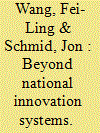

|
|
|
|
|
| Summary/Abstract |
This article describes the nature of innovation performance in the People’s Republic of China (PRC) in the context of its changing national innovation system (NIS). More specifically, it proposes to explain China’s lack of frontier innovation as reflected by the low quality of Chinese patents and scientific publications. Moving beyond the NIS—the prevailing framework for understanding national innovation rates—this article offers additional determinants to explain the unique profile of Chinese innovation. Through interviews with stakeholders from each of the three major NIS actor types and analysis of the incentive environment, two determinants of China’s high rate of nominal patenting are identified. First, the incentive structure facing inventors, scientists and entrepreneurs is found to be ill-suited to promoting innovation. Second, the ubiquitous officials-rank standard (guan benwei) is identified as a mediating variable that amplifies the effect of suboptimal incentives in promoting nominal (as opposed to real) innovation. In essence, the authors find that ill-structured innovation incentives and the officials-rank standard work in tandem to create a high proportion of nominal innovations in the PRC.
|
|
|
|
|
|
|
|
|
|
|
|
|
|
|
|
| 2 |
ID:
071708
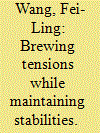

|
|
|
|
|
| Publication |
2005.
|
| Summary/Abstract |
As a key institution in the PRC, the hukou (household registration) system defines and conditions Chinese politics, social life, and economic development. This article describes the current status of the hukou system and its significant changes, and outlines its complicated but crucial functions. The hukou system facilitates a rapid but uneven economic growth and creates significant social and regional disparities. It also helps greatly to stabilize the PRC sociopolitical order through an effective police control, while generating powerful tensions in the areas of human rights, equity of citizenship, and simple ethics. Further reform of the system is needed to continue its role in the Chinese political economy; yet a withering or abolition of the hukou may seriously challenge China's sociopolitical stability and economic growth.
|
|
|
|
|
|
|
|
|
|
|
|
|
|
|
|
| 3 |
ID:
134612
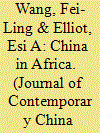

|
|
|
|
|
| Summary/Abstract |
This article reports and analyzes China's presence in Africa with an emphasis on how that has been perceived by the Africans. Based on the findings from surveys and field research conducted in eight sub-Saharan African countries and interviews with scholars and practitioners from other African countries as well as Chinese and Americans in Africa, we outline the diverse, complicated and evolving African perceptions about China's explosive presence in general and the booming Chinese business activities in particular that now range from love to suspicion. Our findings about how China is perceived in Africa suggest that Beijing has acquired substantial goodwill in Africa yet is developing deep issues and facing uncertain challenges and growing obstacles.
|
|
|
|
|
|
|
|
|
|
|
|
|
|
|
|
| 4 |
ID:
058863
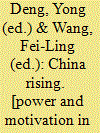

|
|
|
|
|
| Publication |
Lanham, Roman & Littlefield Publishers, 2005.
|
| Description |
viii, 349p.
|
| Series |
Asia in world politics
|
| Standard Number |
0742528928
|
|
|
|
|
|
|
|
|
|
|
|
Copies: C:1/I:0,R:0,Q:0
Circulation
| Accession# | Call# | Current Location | Status | Policy | Location |
| 049134 | 327.51009/DEN 049134 | Main | On Shelf | General | |
|
|
|
|
| 5 |
ID:
047604


|
|
|
|
|
| Publication |
Houdmills, Macmillan Press Ltd., 1998.
|
| Description |
xviii, 227 p.
|
| Standard Number |
0333730801
|
|
|
|
|
|
|
|
|
|
|
|
Copies: C:1/I:0,R:0,Q:0
Circulation
| Accession# | Call# | Current Location | Status | Policy | Location |
| 043102 | 303.40951/WAN 043102 | Main | On Shelf | General | |
|
|
|
|
| 6 |
ID:
075499
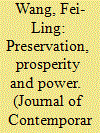

|
|
|
|
|
| Publication |
2005.
|
| Summary/Abstract |
This article describes the motives behind the making of the current status-quo and risk-averse Chinese foreign policy. It identifies a three-P incentive structure that is based on the political preservation of the CCP regime, China's economic prosperity, and Beijing's pursuit of power and prestige. These three motives are stable and overlapping, featuring Taiwan and the relationship with the United States as the key issues. Beijing is expected to be motivated by these peculiar motives over the next two decades; but new internal and external developments may greatly change these motives and generate new impetus for China's foreign policy. Although the official line in Beijing is still the mild 'peaceful development', after a fling with the more majestic idea of 'peaceful rise', the rise of nationalist emotions and demands in the PRC continues.
|
|
|
|
|
|
|
|
|
|
|
|
|
|
|
|
| 7 |
ID:
052290
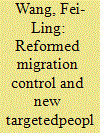

|
|
|
|
|
| Publication |
2004.
|
| Summary/Abstract |
This article outlines the latest reforms of China's hukou system in 1997-2002 and reports the system's functional changes and continuities. Today's hukou system still performs two leading functions: the widely discussed internal migration control with reformed mechanisms and the previously scarcely examined socio-political management of the targeted people (zhongdian renkou). An adapted and adjusted hukou system is expected to continue as a key component of China's institutional framework, playing a crucial role to determine socio-political stability, facilitate a rapid but uneven economic growth, and shape socio-economic stratification and spatial inequality in the PRC.
|
|
|
|
|
|
|
|
|
|
|
|
|
|
|
|
|
|
|
|
|